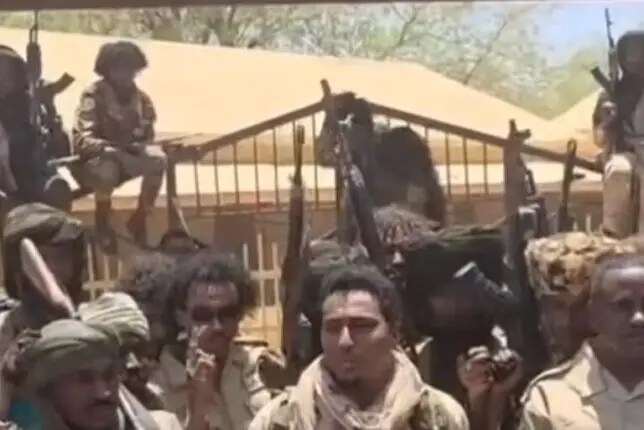“Al-Nuhud”… A City Known Only for Sacrifice and Bravery

Sudan Events – Agencies
Al-Nuhud, a city in West Kordofan State, lies on the national highway linking Khartoum – Kosti – El Obeid – Al-Nuhud – El Fasher – Nyala – Kass – Zalingei – El Geneina. It is also located on the national export road (Omdurman – Bara – El Obeid – Al-Nuhud – El Fasher – Nyala – Kass – Zalingei – El Geneina), giving it a multidimensional strategic importance. In addition to its key location in West Kordofan, Al-Nuhud is one of the most significant Sudanese cities in terms of the traditional economy. It hosts a major crop market for gum arabic, peanuts, and sesame, and it also has the country’s second-largest veterinary quarantine facility after Kadero. The city is central to major livestock markets, especially for red sheep (“Al-Hamari”) in Al-Khuwai and Ghobeish—commonly referred to by locals as “Jirban.” These three markets—Al-Nuhud, Al-Khuwai, and Ghobeish—are the main suppliers for domestic markets across Sudan and are vital sources for livestock exports. Moreover, during Hajj season, they supply sacrificial animals (“Hady”) to the Kingdom of Saudi Arabia, enabling pilgrims to perform their rites according to Islamic law.
Al-Nuhud is also one of the major cities in the greater Kordofan region, second only to El Obeid, which lies about 204 kilometers away, and 102 kilometers from Al-Khuwai. It stands out in terms of population density and economic activity and serves as the traditional headquarters of the Hamar Arab tribe, whose roots trace back to the Arabian Peninsula and the Maghreb, especially Tunisia.
Al-Nuhud is the largest city in West Kordofan, located in the northern part of the state. If not for legal standards governing the designation of state capitals, it would have been the capital of West Kordofan instead of Al-Fulah, which lies at the state’s center.
The Important Question:
What does Al-Nuhud mean to the rebel Dagalo militia?
This question does not require much effort to answer. Beyond its strategic importance, there are several reasons why the rebel Dagalo militia places great value on Al-Nuhud:
Since the militia leader assumed the role of Chairman of the Sovereign Council following the December 2018 and April 2019 revolution, he has consistently tried to lure community leaders and tribal chiefs into his fold, militarizing their youth within the Rapid Support Forces and encouraging them to join Operation Decisive Storm.
These efforts failed with the Hamar tribe under the leadership of the chief (Prince) Abdul Qadir Munim Mansour, who proudly rejected all such temptations.
Al-Nuhud is one of the Sudanese cities known for education and enlightenment. It was among the Kordofan regions that hosted forums in support of the Graduates’ Congress and engaged in clear cultural and intellectual activity. A testament to this is the establishment of the Al-Salam Cultural and Social Club in 1918.
The city has substantial infrastructure, especially in education and healthcare, and it hosts the University of West Kordofan—one of the regional universities that contributed to the expansion of higher education in Sudan.
Al-Nuhud serves as a hub for the northern towns of West Kordofan State (Al-Khuwai, Dam Jamed, Ghobeish, and Wad Banda)—all vital areas strategically positioned to link Kordofan and Darfur through the national export road.
Al-Nuhud is one of the Sudanese cities that excel in embracing diversity. Its neighborhoods have welcomed populations from North, South, and East Sudan, and people from across greater Kordofan have settled and continue to long for it.
National Figures from Al-Nuhud:
The city has given birth to many prominent national figures. For instance, the late Mohamed Ahmed Abu Rannat, the first Chief Justice of Sudan and a key figure in the Sudanization of the judiciary from British hands. Although originally from the Shaigiya tribe, he was born in Al-Nuhud’s Abu Rannat neighborhood.
Another notable figure is Dr. Ibrahim Munim Mansour, former Minister of Finance and National Economy, and a historian of Al-Nuhud. He is the son of Chief Munim Mansour, a leading native administrator during colonial times, and the brother of the current Hamar chief, Prince Abdul Qadir Munim Mansour.
Also hailing from Al-Nuhud is Dr. Bashir Adam Rahma, former governor of West Darfur State, a leading member of the Popular Congress Party, and a university professor specialized in veterinary medicine.
Among its icons is retired Major General Hussein Al-Hassan, former head of the Military Judiciary Department of the Armed Forces and a renowned poet.
Another literary figure is poet Taj Al-Sir Al-Hassan, author of the famous poem “Asia and Africa,” which was performed by singer Abdel Karim Al-Kabli during the Bandung Conference.
Despite everything, Al-Nuhud remains a city defined by values of sacrifice, bravery, and redemption.
With its strategic location and social fabric, it stands as a decisive factor in ending the Dagalo terrorist militia. The current retaliatory campaigns being carried out in Al-Nuhud against its symbolic figures are a clear indication that this militia senses its end is near.
Source: “Sudanese Echoes” website



